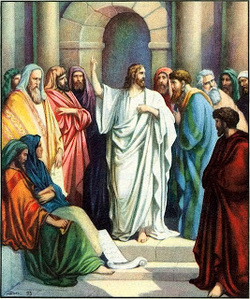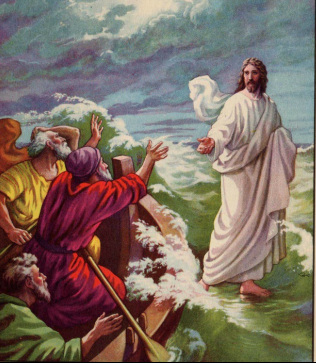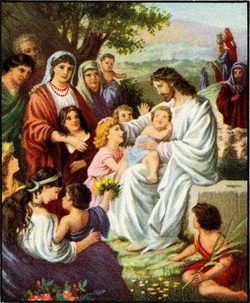
The lintel above the door of the synagogue—which has been found lying among the ruins—had carved on it a pot of manna with vine leaves and clusters of grapes. As He passed beneath, our Lord will have looked up and thought how fitly it was there that day. For He was going to speak for the first time of that Gift of gifts to us, His own Real Presence in the Blessed Sacrament under the appearances of bread and wine.
The Church calls this Sacrament an abridgment of all God's wonderful works. Everything about it is so marvellous that men had to be prepared for it by other marvels and by types. There was the manna in the wilderness, the food of their fathers on their way to the Promised Land. There was Melchisedech's sacrifice of bread and wine. There was the food of Eli as given to strengthen him in his flight from his enemies. There was the changing of water into wine at the marriage feast of Cana. And there was that miraculous multiplication of bread in the desert the day before, of which all minds were full.
The congregation crowded, into the synagogue till it was a closely packed mass of heads. The Twelve took up their position near their Master. Our Lord mounted the platform, or bima, and sat down. All eyes were fixed upon Him. Looking around with His heart-searching gaze, He said:
"Amen, amen, I say to you, you seek Me because you did eat of the loaves. Labour not for the meat which perisheth, but for that which endureth unto life everlasting, which the Son of Man will give you."
Some from the crowd called out:
"What sign dost Thou show that we may see and may believe ? What dost Thou work?" And this after the miracle of yesterday!
"Our fathers did eat manna in the desert," they went on, "as it is written: "He gave them bread from Heaven to eat." Jesus said to them:
"Amen, amen, I say to you: "Moses gave you not bread from Heaven, but My Father giveth you the true Bread from Heaven. For the bread of God is that which cometh down from Heaven and giveth life to the world." They said to Him:
"Lord, give us always this bread." Jesus said to them : "I am the Bread of life; he that cometh to Me shall not hunger, and he that believeth in Me shall never thirst." Wayward and fretful, they murmured at Him now because He said: "I am the Living Bread which came down from Heaven." And they said to one another:
"Is not this Jesus, the son of Joseph, whose father and mother we know ? How then saith He: "I came down from Heaven?" Jesus answered and said to them:
"Murmur not among yourselves. . . I am the Bread of Life. If any man eat of this Bread he shall live for ever, and the Bread that I will give is My flesh for the life of the world." The discontent and murmuring increased. It was a repetition of the scene in the synagogue at Nazareth, the same enthusiastic reception of our Lord, the same eager listening at the beginning of His discourse, the same indignation and rejection before the end.
"How can this man give us his flesh to eat?" they asked. Tens of thousands have asked this question since that day:
"How can Christ be present whole and entire in the Host?" The answer is that we do not know how. Our Lord did not tell the Jews to understand the mystery, but to believe it, to believe Him who for years had been working among them the signs for which they asked, signs such as no other man had ever wrought. They ought to have believed His word and waited humbly to see how He would accomplish it. But instead of this many even of His disciples among the crowd said:
"This saying is hard, who can hear it?" And they went back and walked no more with Him. Let us stop a moment to ask what this wonderful Promise really meant, and why so precious a Gift was left us.
When our Divine Lord took a body and soul like ours and the Word was made Flesh and dwelt amongst us, He did not mean this dwelling in our midst to be merely for the time of His mortal life, and for the few who were able to approach Him then. It was to be for all time and for all mankind. His blessed body, whose touch gave life and healing to the sick of Galilee and Judea, was to be our life and healing, too. Nay, we were to be allowed a closer union with Him than were those whose sores He touched and healed. He promised a Divine Bread that should give life to the world. This Bread was to be His Flesh and the food of all who should believe in Him:
"My Flesh is meat indeed and My Blood is drink indeed," are His solemn, earnest words.
When our Lord spoke in parables, He explained their meaning clearly, at least to the Apostles. But there was no parable here. He meant just what He said, and when some of His hearers, refusing to believe, went away, He let them go. He would have let the Twelve go had they refused to take His words as He meant them, in their simple, literal meaning. The way in which He was going to make this Gift to men and the manner in which His Body and Blood were to be received, He did not at this time explain. He watched the disciples going away, and, turning to the Twelve, said sadly:
"Will you also go away?" Simon Peter, his face aglow with love and loyalty, replied for all:
"Lord, to whom shall we go? Thou hast the words of eternal life. And we have believed and have known that Thou art the Christ, the Son of God."
Our Lord accepted from their spokesman, Peter, this solemn confession of faith from eleven among the
Apostles. But not from the twelfth. For He saw among His Twelve one who for some time past had followed Him in body only, whose heart was far away. Judas was now full of anger and vexation because his Master had refused the earthly kingdom which the people had pressed upon Him. He did not care to be His disciple any longer, and He was annoyed at His teaching and at the marks of reverence shown Him.
The heart of Christ our Lord, then, was full of sadness this day at Capharnaum. Though nothing disturbed His peace or tried His patience, unkindness, distrust and ingratitude wounded Him sensibly. He felt keenly the rejection of His best Gift, the desertion of His disciples, the gradual hardening of heart and falling away of one of the Twelve. For of all hearts His was the most faithful, the most tender and affectionate.
A printable file as well as a coloring picture of this chapter is below.
|
| ||||


 RSS Feed
RSS Feed